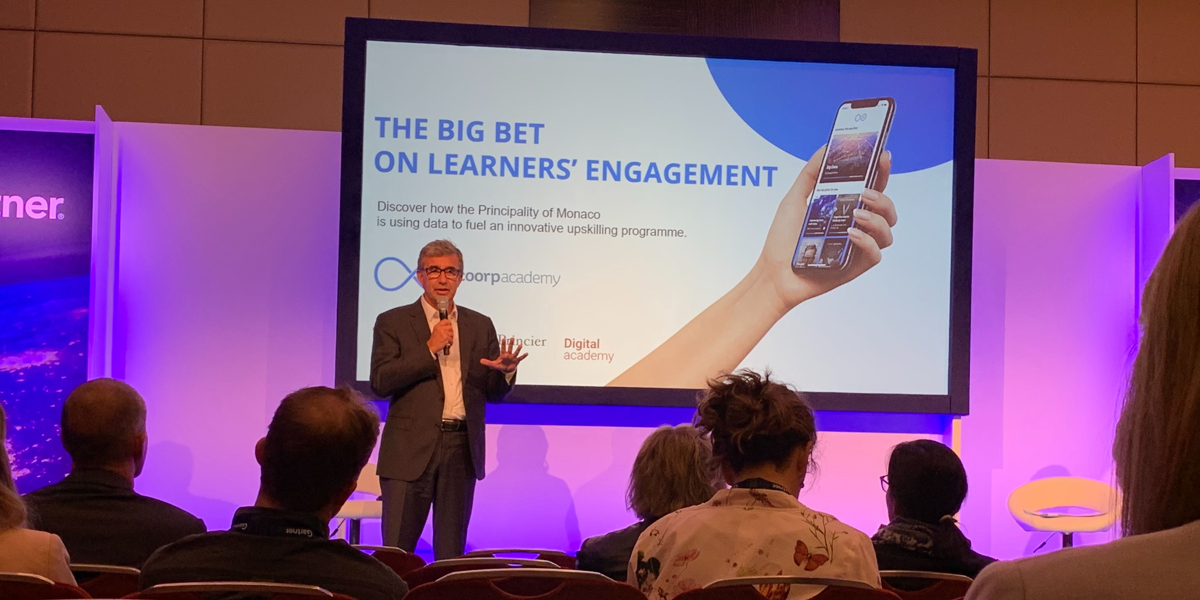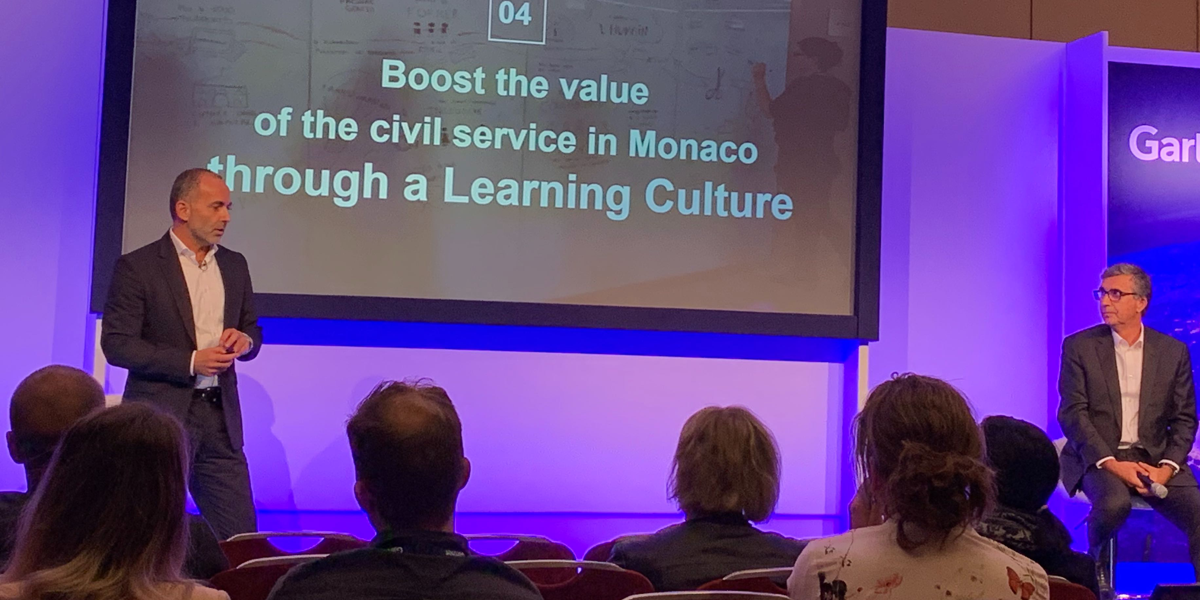“If somebody describes to you the world of the mid-21st century and it sounds like science fiction, it is probably false. But then if somebody describes to you the world of the mid-21st century and it doesn’t sound like science fiction, it is certainly false. We cannot be sure of the specifics, but change itself is the only certainty”, says futurologist and author Yuval Harari.
Change means disruption – and getting ready for change. And HR leaders need to proactively help people develop, adapt and learn new skills as part of this change if they are serious about retaining their competitive advantage.
This article from Jean-Marc Tassetto, co-founder of Coorpacademy, featured in Training Journal in the September edition – the UK’s most influential Learning & Development publication – looks at how the most advanced learning experience platforms are revolutionising the analytical possibilities for L&D professionals. Allowing them in the end to unlock and consider the full potential of their people: a good thing for business and, most of all, for the future of the employees. Discover the article!
Capturing Learner Data
Jean-Marc Tassetto looks at how the most advanced learning experience platforms have revolutionised the analytical possbilitiés for L&D professionals.
It’s no secret that the global workplace is going through a huge transformation. The arrival of automation, connectivity and artificial intelligence is seeing employees increasingly work alongside complet – not always transparent – technological processes.
As futurologist and author Yuval Harari says, the only thing we can be certain of is that our future in uncertain: “If somebody describes to you the world of the mid-21st century and it sounds like science fiction, it is probably false. But then if somebody describes to you the world of the mid-21st century and it doesn’t sound like science fiction, it is certainly false; We cannot be sure of the specifics, but change itself is the only certainty.”
Change means disruption – and getting ready for change. According to a recent survey by global analysts PwC, for example, 80% of CEOs said securing the right skills for the new digital economy is one of their biggest challenges.
The same survey found that 74% of employees are ready to learn new skills or retain to be employable in the future.
But HR leaders still need to proactively help people develop, adapt and learn new skills as part of this change if they are serious about retaining their competitive advantage.
But despite all this context of disruption, there is a positive outlook for humans in the job market. By 2022, says the World Economic Forum, emerging occupations are set to increase from 16% to 27% of the employee base of large firms globally, while job roles currently hit by technological obsolescence are set to decrease from 31% to 21%. THe body estimates that 75 million current jobs roles may be displaced by the shift in the division of labour between humans, machines and algorithms – meanwhile 133 million new job roles may emerge at the same time.
Jobs going? Yes, but jobs are coming.
In other words, robots are being added to the workplace but so are people – with new and different skills. US staffing giant ManpowerGroup, for example, has stated that it is reskilling people from declining industries such as textiles for jobs in high-growth industries such as cyber security, advanced manufacturing and autonomous driving.
Growth is also forecast in frontline and customer-facing roles – which all necessitate interpersonal skills such as communication, negotiation, leadership, persuasion, complex problem-solving and adaptability.
With talent shortages at a 12-year high and new skills emerging as the world gets more connected, companies are also realising they can’t source the skills they want at short notice. ManpowerGroup found that a staggering 84% of organisations expect to be upskilling their workforce by 2020. What would that look like in practice? The World Economic Forum estimates the average employee will need 101 days of retraining and upskilling in the period up to 2022.
This is no small ask for HR and L&D departments. And while there is unlikely to be a jobs apocalypse in the future, if organisations don’t take the right steps now there will be a drought of skilled talent, which will have a detrimental impact on the bottom line. What we can be sure of is that technological change will necessitate employees continuing the L&D process throughout their careers, requiring strategic lifelong learning plans.
Where is the hard ROI training data?
Supporting such plans will put pressure on organisations to provide comprehensive and imaginative L&D opportunities to fully support us through these changes. That’s not great news at a time when training budgets are being squeezed and the C-suite is demanding to know its return on training investment. So having the right metrics and guidance to show proof of ROI back to stakeholders is now more crucial than ever. Let’s review how important that is. At the Learning Technologies exhibition and conference in February this year, independent HR analyst firm Fosway revealed the first preliminary results of its annual digital learning realities research, and the verdict was not positive: “By not providing hard evidence of how learning is adding value on an individual, team or organisational level, practitioners are missing a huge opportunity to gain recognition of their contribution to the organisation and much-needed investment for future learning,” warned the organisation’s director of research, David Perring.
Perring went on to detail how only 14% of the UK HR community can say with confidence they are effectively measuring the impact of learning, while around half are doing so, but poorly, and a third are not measuring impact at all. No wonder, when asked to describe the L&D industry’s progress in measuring learning impact, this analyst responded with just one word: “terribly.”
Help may finally be at hand
The good news is that a way of mapping training investment to measurable bottom-line results may be about to become available at last. That’s in the shape of the learning experience platforms (LEPs), recently formalised as a new market category by Gartner, which have started to become increasingly common in L&D work in the past few years.
Highly user centric in their delivery model and usability, it’s maybe less well understood that the most advances of this class of edtech software has also revolutionised the analytical L&D palette;
The advanced LEPs in question track learner behaviour and use that data to test what works and what doesn’t, based on a powerful new way of collecting such data – the Experience API or xAPI standard. That’s a really significant step forward because, until very recently, learning analytics only existed in a very basic way. That was because learning management systems (LMSs) managed access and tracked participation of learners, namely the attendee list – but little else. There may in addition be information on e-learning content downloads, task completions and module completion, but the data was thin to say the least.
xAPI and activity streams
The gamechanger here in these modern LEPs is the new interface, as xAPI allows us to record any learning experience, including informal learning, providing a much richer picture of an individual’s learning path. The Experience API also prevents data from remaining in the confines of your siloed LMS, as it succeeds the older de facto e-learning standard SCORM (the sharable content object reference model) and is capable of correlating job performance data with training data in order to assess training effectiveness.
Let’s make that a bit more concrete. If you look at someone’s Facebook wall, what you are looking at is a series of activity stream statements; and activity streams are gaining traction as a useful way to capture a person’s activity, both on social networks and in the enterprise.
xAPI uses the same format to capture learning experience data, and as we start to aggregate these streams across an enterprise, or even across an entire industry one day, we can start to identify the training paths that lead to the most successful or problematic outcomes, and so what determines the effectiveness of our whole training programme.
Doing that would enable organisations to glean new insight into what a learner has successfully learned, how they gained this knowledge and which learning approach they chose to follow. This provides opportunities for strong diagnostic values and advance performance indicators, such as curiosity, or resilience – both hugely valuable people metrics. And, of course, this will ultimately aid the workplace learner as he or she becomes aware of what their own data says about their progress and experience, so as to ensure long-term employability.
This transformative potential of these new indicators is even greater if you consider that World Economic Forum identified reskilling and upskilling of the current workforce as the number-one strategy companies need to embrace in light of our continuing transformation into a knowledge economy. Knowledge, in the Google age, is easily acquired – while curiosity on the other hand seems less ubiquitous, and many commentators believe we need to boost employee curiosity as well as builder greater resilience and adaptability to change.
In conclusion
Summing up, the demands of the modern workplace mean we now need to move to a far more learner centric model, where classroom training is supported by virtual training, available on demand, wherever and whenever the learner wants to access it. Such learner centric approaches and leading edge xAPI-enabled technology are proven to work – and most importantly, secure high levels of user engagement.
Together with the benefits this new generation of LEP-derived behavioural learning analytics could bring, this puts training back at the centre stage in business. Exactly where it needs to be to satisfy the growing and diverse skills requirements of a digital future.
The result: HR and training professionals can finally use multiple data sources to consider the full potential of their people for specific roles within the organisation and business outcomes. And this has got to be a good thing – for the business and, most of all, for the future of the employees.
Jean-Marc Tassetto is co-founder of Coorpacademy and a former head of Google France; Find out more at coorpacademy.com



